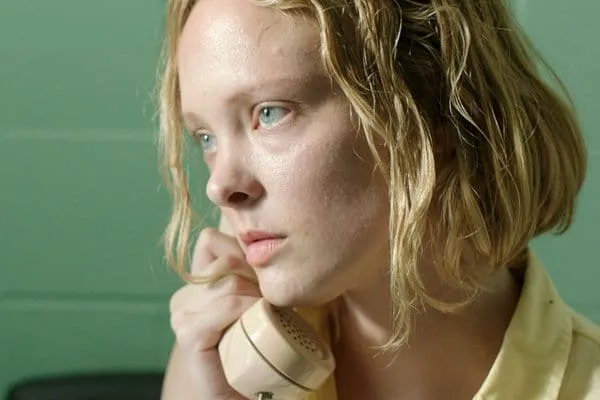Eye For Film >> Movies >> Beauty Mark (2017) Film Review
Beauty Mark
Reviewed by: Jennie Kermode

When people talk about child abuse, the focus in usually on the impact it has in childhood itself, sometimes with reference to a need for counselling in later life. The public is generally sympathetic to the notion that it must be traumatic at the time, but what tends to be overlooked is the massive effect it can have, going forward, on physical health and socioeconomic status. Research by the Centre for Disease Control and Prevention (CDC) suggests that the average lifetime cost for US abuse victims is $210,012. This, in turn, leads to social exclusion and stigmatisation, with survivors who struggle to support themselves being perceived as scroungers who have failed to take responsibility for their own lives - prejudice that makes it harder for them to recover.
Despite this reality, films about child abuse tend to focus on survivors with high social status - nice middle class women who suddenly fail to cope and reveal a tragic history of misplaced shame which can be magically assuaged by love. Few filmmakers dare to take on the messiness of real life. Beauty Mark is, in this regard, an exceptional piece of cinema. Continuing to push the envelope throughout its running time, it makes for uncomfortable viewing and it's probable that some survivors will feel anger at the way it approaches sexuality and sexual empowerment, but it's a convincing character study focused on a character who has faced more than one crisis in her life.
That character is Angie (Auden Thornton), a young woman who, as the film opens, is facing the fact that chronic problems with her rented home mean it's going to be condemned - and she will be evicted. As so often, that state's focus is on protecting the poor by clamping down on substandard housing but without helping them find anywhere else to go. Angie's mother Ruth Ann (an impressive Catherine Curtin) has a troubled history of her own, which may account for her refusal to work and determination to survive on disability payments for which she no longer qualifies. Angie also has a young son (Jameson Fowler) to support (with the fact that she's white and he has brown skin meaning the family faces further prejudice), so she has to secure them a new home - which means she needs to find $1,700 dollars within a week.
It's not uncommon for people making sexual abuse claims to be accused of being in it for the money. Beauty Mark invites viewers to question what exactly would be wrong with this. Like many survivors, Angie never involved the law after being abused by a man from her church. She focused on getting on with her life. But now that her situation is desperate, she's ready to investigate whether or not there's a way she can get the money she needs from him. After all, as she puts it, "He took something from me."
This is a film packed full of issues but to call it an issue film would be to do it a disservice: it's a fair reflection of the way that both abuse and poverty factor into people's lives, with many solutions that might seem simple proving impossible for Angie to reach. Her abuser, Bruce (Jeff Kober) isn't some distant, shadowy figure but a very real and immediate presence in the film, uninterested in facing the reality of his actions and still trying to get sexual access to Angie. His downbeat ordinariness makes their interactions all the more disturbing, as do all the little reminders of how economic power factors into relationships past and present. Although there are sympathetic male characters in the film, there are reminders of how commonplace male abuse of women and children is and how easily people can come to take it for granted. Similarly, Angie encounters, again and again, the attitude that she's causing unnecessary trouble by making a fuss.
Potraying a number of different survivors with various different coping mechanisms, the film underscores the different present day risks Angie faces on her journey, which takes her to places she did not anticipate. Thornton is assured throughout and provides a focal point through which viewers who have never experienced such things themselves can connect with and understand Angie's situation. The horror here is not, as so often, mysterious and pitiful, but stark and banal. Angie is a fierce, focused protagonist; the film serves as a reminder of how much strength it can take simply to keep going, and of the invisible triumphs of people all around us whose stories we would never guess at.
Reviewed on: 18 Jun 2017















